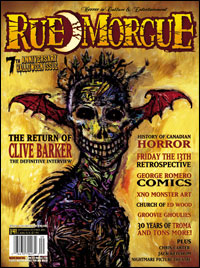|
H.H. HOLMES |
 |
Like horror movies? Sure you do. Which means you're probably a fan of low-budget
filmmaking since Hollywood's current idea of scary is Van Helsing.
The underground has bred some of the best chillers of recent years, but indie
doesn't always mean good. Bad acting, cheesy effects and incompetence have
spoiled more than one ambitious but shoestring production. The same goes for
documentaries. Low budget by nature, docs often suffer from a surfeit of ideas
but a paucity of professionalism.
John Borowski, though, proves that determination, guts and talent can overcome
any financial limitation. It took the director/writer/producer three years
and several maxed-out credit cards to make H.H. Holmes: America's First
Serial Killer, but his efforts were worth it. Through an uncanny use of
photos, narration, music and dramatic recreations, Borowski brings to life
the story of "the monster of 63rd Street."
This is basically the same story told in Erik Larson's fascinating book The
Devil In The White Story. In the last years of the 19th century, Henry
Howard Holmes (née Herman Mudgett) used his affinity for medicine and
crime to become America's first known serial killer. The man set up shop in
Chicago as a pharmacist just as the Columbian Exposition was being built in
the Windy City. Realizing that millions of visitors from around the world
would soon descend upon the city, he constructed a hotel (later known as The
Castle) close to the fairgrounds to house the hordes. Visitors came but not
all of them went. For Holmes, you see, had built a house of horrors, complete
with a basement filled with vats of acid, a dissection table, various instruments
of torture, and a blast furnace to dispose of his victims' remains. Holmes'
body count has been estimated to be anywhere between nine and 100 victims.
Borowski's script, read with authority by trained actor Tony Jay, details
Holmes's crimes with ruthless efficiency. The recreations, filmed in silent
black & white, are evocative but leave details to the imagination. Douglas
Romayne Stevens' score successfully recalls Bernard Hermann's efforts for
Alfred Hitchcock, helping create genuine tension as the story wends its way
from crime to punishment.
The result is a compelling documentary told with authority and confidence,
money be damned. - Sean
Plummer
Rue Morgue Magazine
September/October 2004, Issue 41
